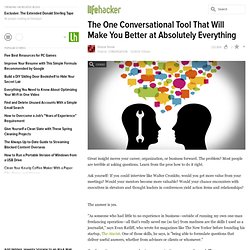

Four Ways to Make Difficult, Serious Conversations More Productive. The One Conversational Tool That Will Make You Better at Absolutely Everything. Hi 1) @LoneTruth look for 1) 2) @tearsana look for 2) 3) @TheRab and @Truefire guess (did you not see ChillyPepperz reply?)

(Ex 1: please see further below. Q: Time to stand up?) Ex 2: (*One* = maybe not, and **Two** = bad) 1) What *do you think* of this website's **terrible** commenting system? (Answers might be: "It's not that bad") 2) *Why* does lifehacker's commenting system **suck** so much? 5 Steps for Dealing With People Who Talk Too Much. On How to Disagree. We live in a world saturated with disagreement.

People are at odds about pretty much everything from when to order a taxi, go out to dinner to whether there should be a caliphate; from the kind of orbit the International Space Station should assume; the right way to cook lasagna to whether Hungary is in Eastern or Central Europe, and how long a child should be allowed to play Minecraft on a Saturday morning. While disagreement can be civilised, interesting and productive, it is much too frequently a powerful source of misery: we get enraged and bewildered; we are appalled at the views of others and feel intensely bothered by them; we feel defeated, hopeless and lonely; we agonise, rehearse the conflict alone in our heads, worry, feel guilty, get upset… Disagreement is especially pressing now, because of certain large societal forces that have been building for the last couple of centuries. 1.
Politics The developed world is now democratic. 2. There is also the issue of hierarchy. How to Get People to Like You: 7 Ways From an FBI Behavior Expert. Before we commence with the festivities, I wanted to thank everyone for helping my first book become a Wall Street Journal bestseller.

To check it out, click here. Meeting new people can be awkward. What should you say? How can you make a good impression? How do you keep a conversation going? Research shows relationships are vital to happiness and networking is the key to getting jobs and building a fulfilling career. But what’s the best way to build rapport and create trust? Robin Dreeke can. Robin was head of the FBI’s Behavioral Analysis Program and has studied interpersonal relations for over 27 years.
Robin is the author of the excellent book, It’s Not All About “Me”: The Top Ten Techniques for Building Quick Rapport with Anyone. An Introvert's Guide to Networking. Every week, I get invited to another “must attend” business event sure to be full of important people who could affect my business.

I know I should go, but it’s a chore. All too often, I end up standing in a corner clinging to the one person I know, feeling guilty that I’m not taking advantage of the situation. Recently, I attended a business women’s networking breakfast, held in a large warehouse near the waterfront. I marched through the door and collected my name tag to confront a roomful of 1,200 colorfully dressed, high-energy women chattering. Everyone appeared to be having a great time, making connections. What next? I suspect that many of us struggle at these events, but few admit it. That’s me. But I recognize the importance of this type of activity, so I stick to it — primarily because a few chance encounters at events have led to relationships that have made all the difference in my business.
Have short conversations with lots of people. How to Be Assertive. Waste Less of Your Time in Meetings with the 10-30-50-90 Method. How to Know If You Talk Too Much. We hope the conversations that take place on HBR.org will be energetic, constructive, and thought-provoking.

To comment, readers must sign in or register. And to ensure the quality of the discussion, our moderating team will review all comments and may edit them for clarity, length, and relevance. Comments that are overly promotional, mean-spirited, or off-topic may be deleted per the moderators' judgment. All postings become the property of Harvard Business Publishing. We hope the conversations that take place on HBR.org will be energetic, constructive, and thought-provoking. 42 Ways to Make People Like and Respect You. We all want to be liked, yes. But—perhaps more importantly in the workplace—we all want to be respected. Respect is so important when it comes to your career development.
It comes into play when the higher-ups are considering your ideas, when they’re choosing people to participate in projects, and—yes—when they’re thinking about who’s getting promotions or raises. But too often people associate earning respect with, well, not being very nice. We’re here to tell you that’s not often the right approach. 1. The most basic way to get respect? 2. Along similar lines, get a reputation for being incredibly dependable. 3. You know the whole “dress for the job you want” spiel?